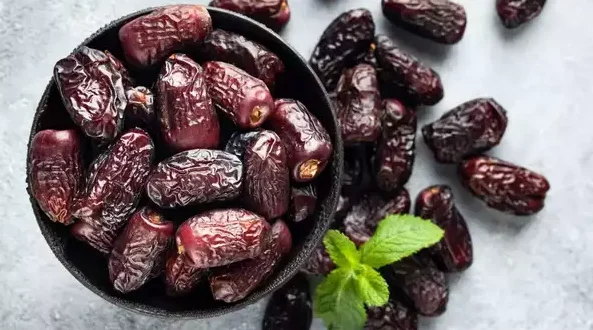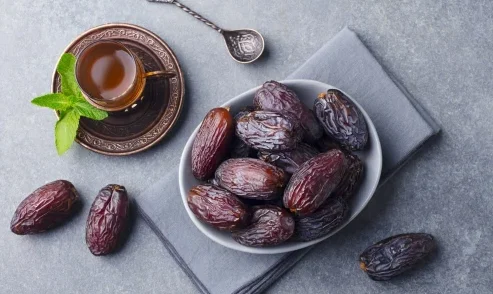Medjool Dates vs. Regular Dates: Understanding the Key Differences
Dates are among the most beloved dried fruits, celebrated for their naturally sweet flavor and versatility in various cuisines. They are a staple in Middle Eastern, North African, Mediterranean, and Indian dishes, enjoyed as snacks, in syrups, or added to desserts. However, dates offer much more than their delightful taste and texture—they’re packed with nutrients that make them a powerhouse of energy and health benefits. Among the numerous varieties of dates, one stands out as the “king of dates”: Medjool dates. But what sets Medjool dates apart from regular dates? Let’s delve into their differences across size, taste, texture, cultivation, nutrition, and more.
Size and Appearance
One of the first distinctions between Medjool dates and regular dates is their size and physical characteristics. Medjool dates are significantly larger, typically measuring 2–3 inches in length, with an oval shape that makes them easy to identify. Their skin is thick and fleshy, while their interior is soft, plump, and chewy.
Also Read: Trucking Injuries Attorney Houston: Seeking Justice After an Accident
In contrast, regular dates, such as the Deglet Noor or Barhi varieties, are much smaller, drier, and firmer. Their thinner, more wrinkled skin gives them a less fleshy appearance. Regular dates often look more compact and less visually striking compared to the rich, glossy appearance of Medjool dates.
Taste and Sweetness
Medjool dates are prized for their deep, caramel-like sweetness. Their flavor is rich, intense, and complex, often compared to toffee or butterscotch. When you bite into a Medjool date, its smooth, melt-in-your-mouth texture and natural moisture make for a luxurious treat. This heightened sweetness makes Medjool dates a fantastic natural alternative to refined sugar in desserts, smoothies, and energy bars.
Regular dates, on the other hand, offer a milder, less intense sweetness. Deglet Noor, a popular variety of regular dates, is known for its subtle, floral sweetness and firmer texture. These dates are better suited for recipes requiring less moisture and sugar, such as baking or as a chewy addition to salads and trail mixes.
Texture and Moisture Content
Moisture content plays a pivotal role in differentiating Medjool dates from regular varieties. Medjool dates are rich in natural moisture, making them soft, juicy, and sticky. Their high moisture content contributes to their fresh, fruit-like quality, which sets them apart from other dried fruits.
In contrast, most regular dates are either semi-dried or fully dried, giving them a firmer, chewier texture. Their lower moisture content makes them less sticky and more shelf-stable, ideal for long-term storage. While some regular varieties, like Deglet Noor, can be semi-dried to retain a balance of moisture and firmness, they don’t match the plumpness of Medjool dates.
Growing and Harvesting
The cultivation process for Medjool dates is labor-intensive and requires specific conditions. They thrive in hot, arid climates, with notable growing regions including Morocco, Jordan, and California, USA. Medjool date palms demand meticulous care, including hand-pollination and careful monitoring during the growth phase. Harvesting Medjool dates is done by hand to ensure the fruit is picked at peak ripeness, preserving its moisture and sweetness.
Regular dates, such as Deglet Noor, are more widely cultivated in regions like Tunisia, Algeria, and parts of the Middle East. These date palms are hardier, capable of growing under varying conditions, and less demanding in terms of labor and resources. Consequently, regular dates are more abundant and cost-effective compared to Medjool dates.
Nutritional Profile
Both Medjool dates and regular dates are nutritional powerhouses, offering a range of vitamins, minerals, and antioxidants. However, their nutritional content varies slightly due to differences in size and moisture levels.
- Medjool Dates: Higher in calories and sugar, with approximately 66 calories and 16 grams of sugar per date. They are rich in potassium, magnesium, fiber, and antioxidants, making them an excellent choice for a quick energy boost or post-workout snack. The natural sugars in Medjool dates provide sustained energy, while their high potassium content supports heart health and muscle function.
- Regular Dates: Lower in calories and sugar, with about 20–23 calories per date. They still offer a wealth of nutrients, including iron, fiber, and antioxidants, but in slightly smaller quantities. Regular dates are a suitable option for those looking for a lighter, less calorie-dense snack.
Shelf Life and Storage
The moisture content of Medjool dates impacts their shelf life, making them more perishable than regular dates. To maintain their freshness, Medjool dates should be stored in an airtight container and kept refrigerated or frozen. They can last up to 1–2 months in the fridge and up to a year in the freezer.
Also Read: Premier Houston Semi Truck Accident Attorney
Regular dates, with their lower moisture content, have a much longer shelf life. They can be stored in a cool, dry place for several months or even up to a year without refrigeration. This makes them a convenient option for those seeking a durable snack or pantry staple.
Price and Availability
Medjool dates are often regarded as a premium product, reflected in their higher price point. Their labor-intensive cultivation, superior taste, and larger size contribute to their cost. Medjool dates are frequently sold in smaller quantities at specialty grocery stores, health food markets, or online retailers.
Regular dates, being more widely grown and easier to cultivate, are more affordable and accessible. They are commonly available in grocery stores and markets, especially in regions where dates are a dietary staple. Regular dates are typically sold in larger quantities, offering a cost-effective option for budget-conscious consumers.
Conclusion
Whether you prefer the rich, caramel-like sweetness of Medjool dates or the mild, floral flavor of regular dates, both varieties have their unique charm and benefits. Medjool dates shine as a luxurious treat or natural sweetener, while regular dates provide a versatile, budget-friendly snack or cooking ingredient. Ultimately, the choice between Medjool and regular dates depends on your taste preferences, dietary needs, and intended use. Regardless of the variety, dates remain a delicious and nutritious addition to any diet, offering a taste of nature’s sweetness with every bite.


